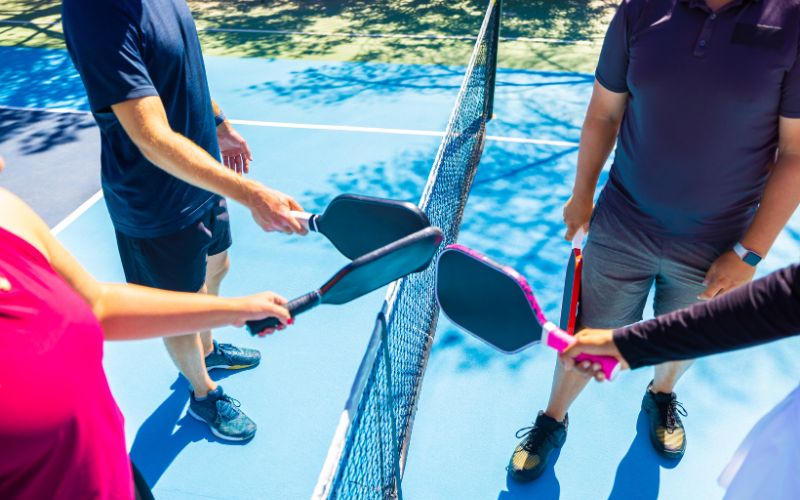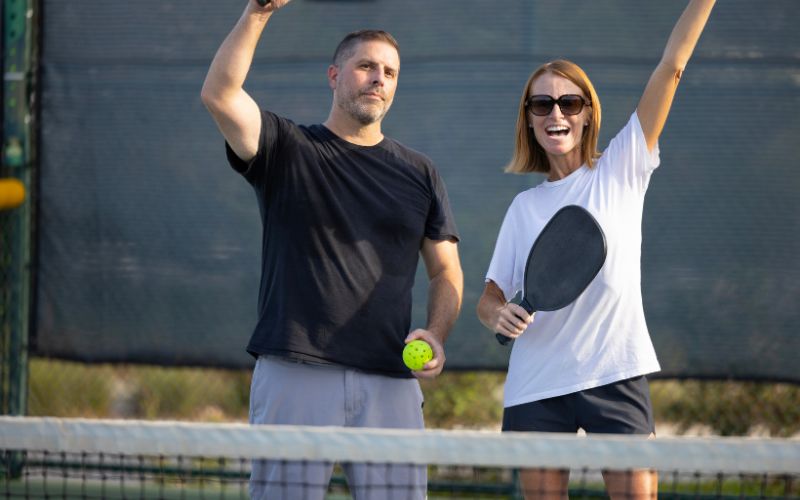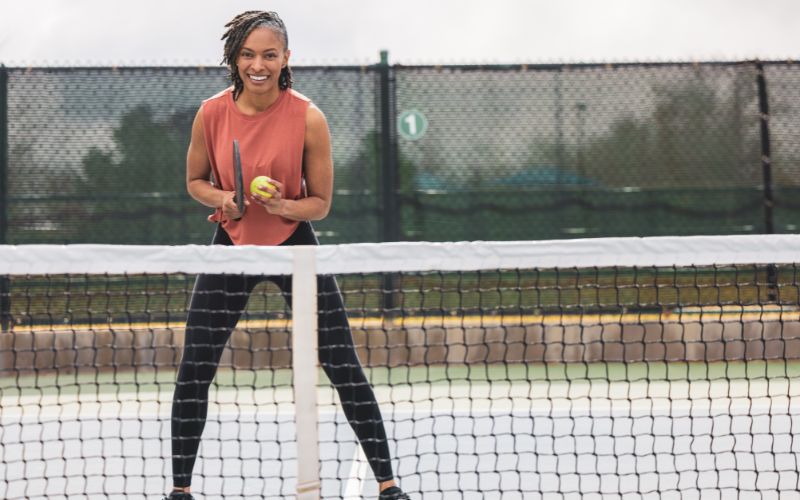Pickleball, a fast-growing sport, demands a deep understanding of court boundaries and line rules to ensure fair play. Pickleball line rules govern the boundaries within which players must keep their shots, defining the legal playing area. Let’s delve into this essential aspect of the game.
The Basics of Pickleball Line Rules
What Exactly Is a Pickleball Line?
Understanding the significance of these lines is crucial to playing the game correctly and ensuring fair play.
Here’s a breakdown of the key lines in a standard pickleball court:
- Baseline: The baseline marks the back boundary of the court, running parallel to the net. It signifies the limit of the playing area lengthwise.
- Sidelines: Two sidelines run perpendicular to the net, marking the court’s lateral boundaries. Any ball landing outside these lines is considered out of bounds.
- Non-Volley Zone Line (Kitchen Line): This line demarcates the non-volley zone, situated parallel to the net and at a distance of seven feet on either side. Players are prohibited from volleying the ball while standing within this zone, except under specific conditions.
- Centerline: The centerline divides the court in half lengthwise, running from the baseline to the non-volley zone on either side of the net.
Understanding these lines is crucial in making accurate calls during the game. A ball is considered ‘in’ if it touches any part of the line, but ‘out’ if it lands entirely beyond the line’s boundary.
Understanding Line Calls
Making accurate line calls is crucial in pickleball. When the ball lands on or touches a boundary line, it’s essential to determine whether it’s ‘in’ or ‘out.’ Players and referees make these calls, which impact the game’s flow and fairness.
Non-Volley Zone Line
The non-volley zone line (kitchen line) is pivotal in gameplay. Players must avoid stepping into this area and hitting volleys while standing within it. Understanding these line calls prevents faults during play.
Doubles Play and Line Calls
In doubles play, line calls require cooperation between partners. Effective communication ensures correct line calling to avoid disputes and maintain sportsmanship.
Importance of Accurate Line Calls
In Pickleball, correct line calls are essential for various reasons:
- Fair Play: Pickleball encourages fair play, relying on players’ integrity.
- Official Rules: Complying with pickleball rules maintains the sport’s standards.
- Tournament Play: In most tournament play, accurate line calls are pivotal for success.
Making Accurate Line Calls
Strategies for Precision
- Observing the playing surface completely helps in making accurate calls.
- Understanding the general rule – if the ball contacts the line, it’s considered ‘in.’
- Using hand signals or calling ‘out’ helps in clarifying line calls.
Line Judges and Accurate Calls
In professional settings, line judges assist in making accurate line calls, reducing errors and disputes during matches.
When is The Best Time to Make a Line Call in Pickleball
In pickleball, the best time to make a line call is as soon as the ball touches the ground and you can clearly determine whether it’s ‘in’ or ‘out’. Quick, decisive calls help maintain the game’s pace and fairness.
Here are key points commonly emphasized regarding the timing of line calls:
- Immediate Decision: Promptly signal your call once the ball lands and you have a clear view. Delays can disrupt the game’s flow and lead to disagreements.
- Confidence in Call: Be sure of your decision before making a call. If uncertain, it’s advisable to give the benefit of the doubt to the opponent.
- Respect Opponents’ Calls: In doubles play, respect your opponents’ line calls. If they call the ball ‘out’, even if you disagree, it’s important to honor their decision.
- Consultation for Disputes: If there’s disagreement or uncertainty among players regarding a line call, stop play and discuss it calmly. Referring to an impartial observer or referee can help settle disputes.
- Maintain Sportsmanship: Uphold good sportsmanship regardless of whether a call favors you or your opponent. Respecting the fairness of the game fosters a positive playing environment.
- Honesty and Integrity: The sport relies on players’ honesty. Integrity in making fair and accurate calls, even if it means conceding a point, is fundamental to pickleball.
Pickleball Rules
- A served ball that clears the non-volley zone and lands within the correct service court or on any service court line is considered in.
- Except during the serve, any ball in play that lands inside the court or touches any boundary line is considered in play.
- Any ball that completely contacts the playing surface outside of the court is considered “out”.
The guidelines for line calling in pickleball follow a Code of Ethics. While the game has specific rules, there’s an ethical code for players performing line-calling duties. These responsibilities differ from those of referees or line judges who make impartial calls considering all players. When players have line-calling duties, they must prioritize accuracy and adhere to the principle that uncertain calls should favor the opponent.
The Fundamental Aspects of Line Calling in Pickleball are as Follows
- Players bear the responsibility of making line calls on their end of the court, excluding specific instances like short serves, service foot faults, and non-volley-zone faults if being addressed by a referee. If a player initiates a line call and seeks the opinion of their opponent(s) or the referee, a clear “in” or “out” call by either the opponent or the referee will prevail. If clarity is lacking, the player’s initial line call stands. However, an opponent’s call can be appealed to the referee for a final decision.
- During matches with line judges, players’ sole line call pertains only to the centerline on the serve.
- In situations where uncertainty arises in line calls, the benefit generally favors the opponent, classifying any unclear call as “in.” Players cannot demand a replay due to lack of visibility or uncertainty. However, they can appeal to the referee if the ball’s landing was unclear to them. Once an appeal is made to the referee by the receiving player/team, they forfeit the right to make further “in” or “out” calls for that rally.
- Certain guidelines dictate player behavior in line calling. Spectators should not be consulted for line calls, and players should refrain from questioning an opponent’s call directly. However, players retain the right to appeal a call to the referee before the subsequent serve.
- There are specific rules concerning seeking an opponent’s opinion for line calls on the player’s end of the court. If the opponent provides a clear “in” or “out” call upon request, it must be accepted. However, if clarity is absent, the ball is ruled “in” for the receiving team/player. Once an opinion is sought from the opponent, the receiving team/player forfeits the right to further “in” or “out” calls for that rally.
- Certain conditions guide the proper execution of “out” calls, demanding clarity in vision between the line and the ball for an “out” declaration. Prompt signaling is crucial for “out” calls, indicating the ball’s status before it’s hit by the opponent or becomes dead.
- The dynamics of “out” calls differ in doubles play, where conflicting calls from teammates result in a benefit-of-doubt approach, considering the ball “in.” Players are allowed to appeal to the referee, especially when the referee didn’t witness the call.
- Proper signaling, communication protocols between players, and the dynamics of overruling calls after a rally are also outlined within the rules.
Mastering line rules is fundamental to ensuring fair and competitive gameplay. Understanding the court boundaries, knowing when and how to make accurate line calls, and upholding sportsmanship are pivotal for an enjoyable pickleball experience. By comprehending these rules and following the ethical standards outlined for line calling, players contribute to a positive playing environment while maintaining the integrity of the sport.
Frequently Asked Questions:
1. What is the significance of understanding pickleball line rules?
Understanding these rules is vital as they define the legal playing area and determine whether a shot is ‘in’ or ‘out’, ensuring fair play and accurate judgment during the game.
2. When should a player make a line call in pickleball?
The best time to make a line call is immediately after the ball touches the ground and when the player can confidently determine whether it’s ‘in’ or ‘out’. Prompt and accurate calls contribute to fair gameplay.
3. How are line calls managed in doubles play?
In doubles play, players need to cooperate for accurate line calls. Respect for opponents’ calls, seeking opinions when necessary, and prioritizing fairness are essential for successful doubles gameplay.
4. What happens in situations of unclear line calls in pickleball?
In cases of uncertainty or unclear line calls, the benefit typically favors the opponent, classifying the call as “in.” Players cannot demand replays due to visibility issues and must follow specific protocols for resolution.
5. What is the players’ responsibility concerning line calls in pickleball?
Players are responsible for making line calls on their end of the court, adhering to specific guidelines and ethical standards. Prompt, accurate calls and cooperation with opponents ensure fair play and uphold the integrity of the game.






